|
|
|
Sort Order |
|
|
|
Items / Page
|
|
|
|
|
|
|
| Srl | Item |
| 1 |
ID:
175656
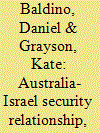

|
|
|
|
|
| Summary/Abstract |
While the Australia-Israeli relationship encompasses a cordial bilateral comradeship, it has not been without diplomatic skirmishes that have tested its reputation and strength. In particular, controversial intelligence liaisons coupled with recurring security-related scandals pose significant risks and challenges to Australian national interests. This article will explore the rationale, execution and hazards of the Australia-Israel intelligence relationship from an Australian perspective. When dealing with intelligence exchange across nations and information sharing with allies that might entail both formal and informal arrangements, it is argued that transparency and secrecy can co-exist when reconciled through robust, independent and well-resourced national oversight institutions. In an era of expanding globalisation of intelligence, targeted accountability advances that are adaptive to global trends may serve to mitigate the potential costs and downsides of transnational intelligence exchange while respecting the rights and liberties of citizens and ensuring that sovereignty, human rights standards and rule of law remain protected.
|
|
|
|
|
|
|
|
|
|
|
|
|
|
|
|
| 2 |
ID:
157234
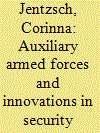

|
|
|
|
|
| Summary/Abstract |
Who rules during the civil war? This article argues that the concept of armed group governance must be expanded to include auxiliary armed forces linked to rebels or the government. Comparing the organization of rebel and government auxiliaries, the article demonstrates that security governance during war is never static, but evolves over time. Evidence from the civil war in Mozambique (1976–1992) shows that the auxiliary’s origin shapes its initial level of autonomy. Second, auxiliary contribution to battlefield success of one side may induce innovations adopted by auxiliaries on the other. Both have distinct consequences for the nature of governance.
|
|
|
|
|
|
|
|
|
|
|
|
|
|
|
|
| 3 |
ID:
131389


|
|
|
|
|
| Publication |
2014.
|
| Summary/Abstract |
Under what conditions do regional security organizations (RSOs) take up a broader agenda or scope in security governance? Further, does broader scope matter for regional security? These questions are addressed using a quantitative comparative analysis of 25 RSOs over the period 1990-2009. Similarity among members in their capacities and political systems are identified as two central conditions for increased scope. In contrast, hegemony is not a significant factor. Institutionalization also seems to matter: RSOs that have been around longer and encompass more members are more successful in expanding their security agenda. There is only weak empirical support for the idea that RSOs with a broader scope have a stronger pacifying effect on regional security. The implications of these findings are discussed in greater detail for Asian RSOs, which have only limited scope and operate in comparatively high levels of insecurity. However, except from the legacy of conflict, variables identified in the general models apply similarly to Asia.
|
|
|
|
|
|
|
|
|
|
|
|
|
|
|
|
| 4 |
ID:
108770
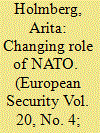

|
|
|
|
|
| Publication |
2011.
|
| Summary/Abstract |
The North Atlantic Treaty Organisation's (NATOs) changing role was debated in the face of the Strategic Concept adopted in late 2010. Two main roles can be identified in the debate; that of NATO as a defence organisation and a security organisation. The article analyses the implications of these roles for security governance and the Alliance's legitimacy - with emphasis on the novelties associated with the role of NATO as a security organisation. This development suggests an increasing need for security governance, something which is reflected in the debate. However, how for instance decision-making and implementation function in a more fragmented environment is unclear. If NATO develops its role as a security organisation new audiences are introduced that determine its appropriateness and the basis of the Alliance's input and output legitimacy changes.
|
|
|
|
|
|
|
|
|
|
|
|
|
|
|
|
| 5 |
ID:
159254
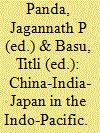

|
|
|
|
|
| Publication |
New Delhi, Pentagon, 2018.
|
| Description |
xviii, 398p.hbk
|
| Standard Number |
9789386618429
|
|
|
|
|
|
|
|
|
|
|
|
Copies: C:2/I:0,R:0,Q:0
Circulation
| Accession# | Call# | Current Location | Status | Policy | Location |
| 059404 | 320.12/PAN 059404 | Main | On Shelf | General | |
| 059405 | 320.12/PAN 059405 | Main | On Shelf | General | |
|
|
|
|
| 6 |
ID:
192666
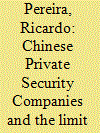

|
|
|
|
|
| Summary/Abstract |
This article analyses how China has overcome the limit of coercion through the use of Private Security Companies since the end of the Cold War until 2021. For this purpose, the Security Governance approach was applied to understand how the decentralisation and fragmentation of the security monopoly by the state could result in convenient coercive acts against societies. We point two paths of observation: an international path – the protection of the Chinese diaspora and the Belt and Road Initiative facilities; and a national path – the governmental interests that pave the monitoring and controlling mechanisms of Chinese society.
|
|
|
|
|
|
|
|
|
|
|
|
|
|
|
|
| 7 |
ID:
137418
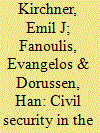

|
|
|
|
|
| Summary/Abstract |
Noting that European Union (EU) institutions are increasingly engaged in civil protection in the member states, security governance is used as an analytical framework to assess the depth of EU engagement in delivering civil security. It is shown that a state-centric approach is no longer adequate to understand the provision of civil security across Europe. To varying degrees, the EU has acquired responsibilities to facilitate, coordinate, manage, and regulate civil security, whether before or after a civil crisis occurs. The analysis demonstrates that, whilst intergovernmental practices and inter-state cooperation remain salient features of civil security, the responsibilities undertaken by the EU institutions across the entire policy spectrum are more substantial than a strictly intergovernmental perspective would suggest.
|
|
|
|
|
|
|
|
|
|
|
|
|
|
|
|
| 8 |
ID:
164296
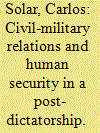

|
|
|
|
|
| Summary/Abstract |
This article explores current developments in Chile, where since the return to democracy in 1990, the elected authorities have reconfigured the nation’s military resources in favour of four action pillars: peacekeeping and international conflict management, landmine removal and gun disarmament, emergency and catastrophe response, and a concern for human, economic and social rights. Successive defence policies offer a valuable case study for exploring the trade-offs between security, traditional and non-traditional threat management and institutional capabilities. The article argues that human security policymaking is not free from undesired outcomes; specifically, regarding how to reconvene the role of the armed forces when conventional war seems a thing of the past. The paper focuses on the interagency policy implications and the challenges ahead for civilians and the military.
|
|
|
|
|
|
|
|
|
|
|
|
|
|
|
|
| 9 |
ID:
087454
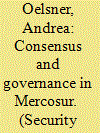

|
|
|
|
|
| Publication |
2009.
|
| Summary/Abstract |
This article constitutes a first exploration of the security governance of Mercosur, the common market of Latin America's Southern Cone. Drawing on securitization theory, the article argues that three major clusters of security issues have consecutively become the focus of the region's security agenda. First, prior to Mercosur's foundation and during the various processes of democratization in the region, the success of democratic transitions, the stabilization of civil-military relations and the region's insertion into the world economy were successfully securitized. At a second stage, more traditional issues associated with the use of military force gained centrality in the security agenda. Finally, and particularly since 11 September 2001, the region's security architecture was redesigned to accommodate `new' security threats. Around the consensuses on these three issue-clusters, formal and informal structures of policy coordination have emerged, constituting a limited system of governance. Yet, though regional governance is admittedly weak, this article contends that the security consensuses and the emerging institutional structures that have ensued are contributing to forging a shared normativity in the Mercosur area.
|
|
|
|
|
|
|
|
|
|
|
|
|
|
|
|
| 10 |
ID:
159367
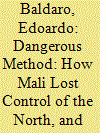

|
|
|
|
|
| Summary/Abstract |
This article analyses changes and failures in the northern Mali system of security governance, taking into account the period running from the declaration of the Malian Third Republic (1992) to the present. Considering northern Mali as an area of limited statehood, the article develops a comparative diachronic analysis, distinguishing between three phases, namely Militiarisation (1992–2002), Fragmentation (2002–2012) and Multiplication (2013–ongoing). For every phase the focus is on (1) the mechanisms of coordination among actors, (2) the distribution of coercive capacities and ruling power and (3) the forms of authority. Unintended consequences and collective problems are highlighted, in order to understand the current situation of insecurity in the area.
|
|
|
|
|
|
|
|
|
|
|
|
|
|
|
|
| 11 |
ID:
130993
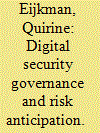

|
|
|
|
|
| Publication |
2014.
|
| Summary/Abstract |
The anticipatory turn in managing security and safety relies not only on innovative technological tools, but also on social practice. New information and communication technology, for instance, facilitates digital security governance1 which entails the collection, processing, storage, and sharing of digital personal data for risk profiling, but little is known about the role of security officials in preemptive security. Although people, or "data subjects," are categorized according to a (predefined) level of potential threat on the basis of digital data, it is often unclear which actor or agency was responsible for this categorization. This is especially unclear when information was shared across the globe between several security agencies and/or private companies. Nonetheless, as the assessment of risk or dangerousness affects someone's real-life opportunities, privacy rights or claims to something or someone are likely to be evoked.
|
|
|
|
|
|
|
|
|
|
|
|
|
|
|
|
| 12 |
ID:
137420
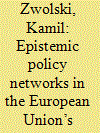

|
|
|
|
|
| Summary/Abstract |
This paper offers insights into an innovative and currently flagship approach of the European Union (EU) to the mitigation of chemical, biological, radiological, and nuclear (CBRN) risks. Building on its long-time experience in the CBRN field, the EU has incorporated methods familiar to the students of international security governance: it is establishing regional networks of experts and expertise. CBRN Centers of Excellence, as they are officially called, aim to contribute to the security and safety culture in different parts of Africa, the Middle East, South East Asia, and South East Europe, in the broadly construed CBRN area. These regional networks represent a modern form of security cooperation, which can be conceptualized as an epistemic policy networks approach. It offers flexibility to the participating states, which have different incentives to get involved. At the same, however, the paper identifies potential limitations and challenges of epistemic policy networks in this form.
|
|
|
|
|
|
|
|
|
|
|
|
|
|
|
|
| 13 |
ID:
129638
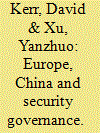

|
|
|
|
|
| Publication |
2014.
|
| Summary/Abstract |
Normative power can be defined as the ability to govern interdependencies by means of rules, regimes and compliance strategies. This paper presents two case studies in security governance-international responsibility to protect in Sudan and counter-proliferation policies towards Iran's nuclear programme-to evaluate the degree of normative convergence between China and Europe. It concludes that there are still major differences between Europe and China on employing normative strategies in security governance but that both modes of governance and identities as security actors are mobile so that the trend is towards convergence, albeit with some distance still to travel.
|
|
|
|
|
|
|
|
|
|
|
|
|
|
|
|
| 14 |
ID:
101005


|
|
|
|
|
| Publication |
2010.
|
| Summary/Abstract |
The central aim of this article is to discuss the question of how we can understand and explain the European Union (EU) as a security actor - in essence, to elaborate on the current literature on security governance in order to provide a more theoretically driven analysis of the EU in security. Our contention is that whilst the current literature on security governance in Europe is conceptually rich, there still remains somewhat of a gap between those that do 'security governance' and those that focus on 'security' per se. We argue that a synergy or at least a conversation between these two literatures is required in order to enrich further the study of the EU as global-regional security actor.
|
|
|
|
|
|
|
|
|
|
|
|
|
|
|
|
| 15 |
ID:
101007
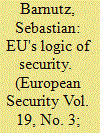

|
|
|
|
|
| Publication |
2010.
|
| Summary/Abstract |
This article develops a methodological approach to analyse the logic of security in the European Union (EU) as an inter-subjective construction. Security is established when discursive practices take place at the interplay of three different fields: (1) EU identity constructions; (2) the perception of challenges as security relevant; and (3) constructions of security practices and hence discourses on governance and governmentality. When discursive practices make cross-references between these fields they construct the logic of security. The empirical section applies this method in order to analyse the EU's logic of security at the turn of the twenty-first century. Understanding the dynamic effects at play between situations of under-development and conflict led not only to the construction of the need to implement civilian as well as military capabilities at the EU level, but this dynamic is also central to understanding the EU's way of approaching international terrorism.
|
|
|
|
|
|
|
|
|
|
|
|
|
|
|
|
| 16 |
ID:
186806
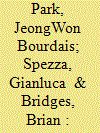

|
|
|
|
|
| Summary/Abstract |
The article examines the European Union (EU)'s policy toward and interactions with North Korea (DPRK) in order to answer the question, "To what extent, despite prima facie ruptures in the relationship, has the EU been engaged with the DPRK, which is conventionally understood as an unreliable state." Although the EU is seemingly inactive in North Korean affairs, yet it is a powerful institution that can play a significant role in the peacemaking process in Asia including on the Korean peninsula. This article explores, firstly, how the EU's policy toward Asia has evolved historically; secondly, how far such an agenda and principles have been implemented in the North Korean context; and finally, the extent to which previous practices pave the way for the two parties to be included in the process of forming a kind of extended regional governance in future. A common view is that the EU's strategical/political motivation for getting involved in North Korean affairs is negligible due to a lack of economic interests to counterbalance high political risks. This article highlights that, contrary to the common understanding of its soft issue-focused approach to Asia, the EU has been persistently engaged in DPRK affairs, notwithstanding the significant structural barriers. This role underpins the EU's growing intention and potential to enhance interactions under the aegis of comprehensive security (third generation cooperation) covering the economic, social, cultural, and human security-focused aspects of the relationship.
|
|
|
|
|
|
|
|
|
|
|
|
|
|
|
|
| 17 |
ID:
133143
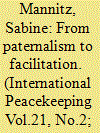

|
|
|
|
|
| Publication |
2014.
|
| Summary/Abstract |
This paper discusses the shortcomings of the established Security Sector Reform (SSR) concept and practice and argues for an overhaul of the ways in which transformations in security spaces are approached. In consideration of the theoretical and practical implications of the quest to involve local actors in SSR, a related research agenda is sketched and a case is made in particular for the inclusion of social anthropological perspectives to foster an empirically grounded evaluation of security governance interactions and transformations in context. This could be relevant to the search for strategies to support longer term facilitation processes and overcome the widespread paternalism in donor-recipient relations.
|
|
|
|
|
|
|
|
|
|
|
|
|
|
|
|
| 18 |
ID:
092903
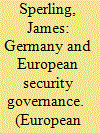

|
|
|
|
|
| Publication |
2009.
|
| Summary/Abstract |
The expansion of the security agenda after the end of the Cold War, propelled by the blowback of 11 September 2001, raises questions about the German ability and willingness to contribute to the regional and global security governance tasks facing Europe and Germany's continuing fidelity to its post-war European avocation. It also calls for a reconsideration of the Birmingham model of foreign policy analysis, particularly its emphasis on (and interpretation of) the ideational and institutional factors defining the German foreign policy agenda and shaping German foreign policy behaviour, at least with respect to the implementation (rather than formulation) of European Union security policies. Towards assessing the continuing utility of the Birmingham model, this article proceeds in three steps: the presentation of the Birmingham model and its restatement as six conjectures; a discussion of the security governance functions undertaken by the EU and the collective action problem facing Europe (and Germany) in executing them; and an empirical investigation of Germany's contribution to the EU as a security actor since 1990.
|
|
|
|
|
|
|
|
|
|
|
|
|
|
|
|
| 19 |
ID:
137540
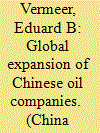

|
|
|
|
|
| Summary/Abstract |
PetroChina, Sinopec, and China National Offshore Oil Corporation (CNOOC) have been prominent instruments used by the Chinese government in its policies to ensure greater security of oil and gas supply in the face of growing domestic shortages. Chinese overseas acquisitions and activities have diversified, with a greater emphasis on offshore, gas and the Americas. Both parent and listed daughter companies are run by CCP-appointed managers who have to balance political and commercial goals. Their lacklustre financial performance can be attributed to domestic and institutional constraints, such as state-set social goals, low pricing, and government controls over their monopolies. Not only have state companies sustained losses from refining activities, but financing their rapid expansion has also increased their debts and dependency on the government. Cases of corruption have further weakened their political influence. Long-term supply contracts have made a greater contribution to the security of energy supply as compared with equity oil and gas. Nationalistic preferences for investment over trade increase company risks but are somewhat mitigated by an integral economic package approach and political backing in weak countries. Recent policies to reduce monopoly power are unlikely to produce viable commercial alternatives, but may increase the focus on listed daughter companies, overseas assets and international trading. Because of these developments and the recent fall in oil prices, a better evaluation of political and economic risks is required.
|
|
|
|
|
|
|
|
|
|
|
|
|
|
|
|
| 20 |
ID:
162413
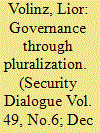

|
|
|
|
|
| Summary/Abstract |
Security responses increasingly involve the delegation of security roles from state actors, such as the police and the military, to a plurality of public and private institutions. This article focuses on the emergence of a modular governance logic in security provision, in which urban security is diffused into differing modules – security actors, performances, technologies and practices – which can be enlisted, deployed, instructed, entwined, detached and withdrawn at will. This article identifies three features of urban modular security provision: the heterogeneity of its public and private components, the development of reserved capacities, and the differential multifacetedness of its performances and practices. These are explored through the case study of East Jerusalem, in which a modular security provision emerged where previously undefined and ad-hoc security arrangements became cohesive, normalized and codified through practice and law. In tracing the flows of security authorities, personnel and knowledge produced within a modular security assemblage, this article proposes that the modular assembly of security actors complements policing institutions by providing other informal disciplinary, punitive and statecrafting powers, in a manner which obfuscates controversial state policies and unequally distributes rights and resources.
|
|
|
|
|
|
|
|
|
|
|
|
|
|
|
|
|
|
|
|
|